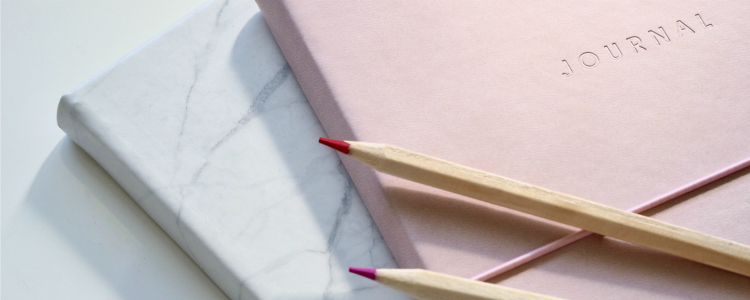Everyone Says I Should Journal, But What’s the Point?
I was told early on, that journaling might be a really effective tool to help me on my journey to recovery. I know from talking to so many other people who suffer with an eating disorder that I’m not the only one who has been encouraged to use writing as a way to connect to my thoughts and feelings.
And it truly has been an effective tool for me. Writing freely can really help me to shake some of the beliefs that I have about my eating disorder and about my body image. It’s been fun to stretch my writing muscles again, some 25 years after the last time I wrote anything substantial, back in high school. But it’s been even more fun to find a new passion.
In my journals, I began to draw and paint for the first time in my life. I found art to be particularly helpful on the days my thoughts or feelings were just too scary or painful to put into words.
And if you’re like I was, you might wonder, what’s the point of journaling? How exactly will this help me with my recovery? Nobody is going to grade me on my journal entries, or hang my journal art on the wall, after all.
But, I’ve realized something. I needed to use this creative outlet as a way for me to learn more about myself and the way I cope, process thoughts, and see the world, in order to really tap into the growth that comes from recovery. This realization came when I noticed an image that had appeared on the pages of my journal more than once. She looked relatively the same each time, and when I really looked at her, it struck me that she looked kind of like me. She was wearing glasses like mine, her hair was similar in length and style to mine, and she had a cute little nose like mine. She was definitely my own image of myself.
I noticed that she also never had a mouth. When I started to think about why that might be, it occurred to me that I had been silencing her and hiding her from the world for as long as I’d had my eating disorder. I’d been keeping the real me locked away where nobody could see me. It spoke volumes to me, and I was fascinated, so I began looking more closely through my recovery journals to see what other themes or patterns I could pick out.
And low and behold, I found Edie. My eating disorder. I had drawn her in my journals more times than any other image and hadn’t even realized that she was there. I mean, I knew I had drawn her, sure. But I hadn’t been aware, in the moment, that she appeared on the days I was struggling the most to silence my eating disorder in my mind. And she looked so mean!
Just like that, I had discovered a secret to journaling that has helped me keep both feet planted in recovery. Reflecting on what I’ve gone through, and looking back at what I was thinking and feeling in those times, has really helped me to understand myself on a much deeper level. In my journaling, I’m now able to pick out warning signals that can lead to unhealthy behaviors or thought processes. I see how my use of colors in what I draw or paint can tell me when I’m needing to revisit certain recovery tools, so I don’t step out of recovery and back into my disorder.
In recovery, it’s important to focus on the future, but I it can also be helpful to look back at what we’ve been through, and how we got through it, to help us see the future more clearly. Sometimes, it’s difficult to look back at the days that I struggled and be reminded of how that felt at the time, but I’ve found it to be the best tool I have for seeing more clearly what I need to do to work towards not having to feel that way again.
I believe full recovery is possible. If I continue with the help of my treatment team, if I keep journaling consistently with creativity, and if I take time to reflect on what I’ve come through, I will get there. And I believe that you can too.
Errin refers to herself as an Artist by Accident. She fell into her love of art when she embarked on her journey to recovery from Binge Eating Disorder earlier this year. She has often been described by friends and peers as driven, passionate, helpful, creative and thoughtful. She has learned, through treatment, how to use those attributes to begin to heal, with the help of her recovery team. When the grip of Errin’s eating disorder tightened in 2016, she launched an at-home business and left the corporate world. She recently gave up that business to focus on her recovery. Now, with her newly found love of art and all things healing/self-love, she is focused on using her experiences to help others who suffer in ways similar to her own struggles. Learn more about Errin’s current endeavor here.





